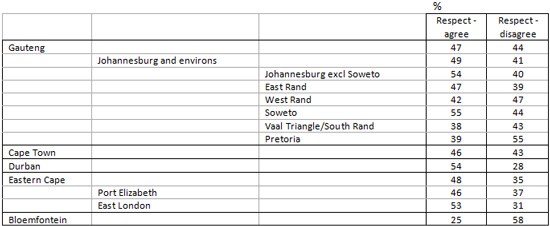
Top stories






More news














Logistics & Transport
Maersk reroutes sailings around Africa amid Red Sea constraints


People were somewhat more in favour of this statement than against, with 48% agreeing, 41% disagreeing and 12% giving a "don't know" response. This is according to a survey released today by TNS Research Surveys, South Africa's leading marketing and social insights company.
The survey was conducted by interviewing people face-to-face in their homes, and has a margin of error of under 2.5% for the overall results.
It is impossible not to look at these results by race group but differences are not as great as might have been expected:
Across all races, females are less positive than are males, with the highest level of agreement being found for black males at 52% and the lowest for white females at 34%. Encouragingly, younger people are more likely to agree with the statement with 52% of those aged 24 years and under agreeing, this dropping to 41% for those aged 60 years and older.
When one looks at the data by income, a trend that has becoming increasingly pronounced over the last year was evident: the more wealthy and the poorest people are less positive (43% of the poorest agree, 46% of the most wealthy agree) but a higher 53% of the middle income groups agree.
Differences by level of education are not evident. However, Muslims are less likely to agree at 33%. When one looks at home language, those whose home language is Zulu (55%) and Xhosa (54%) are more likely to be positive whilst those whose home language is Afrikaans are the least likely to agree (39%).
There are some notable differences by city, linked probably to race and wealth profiles of the different regions:

Soweto, Johannesburg, Durban and East London are the most positive but Pretoria, the South Rand/Vaal Triangle and, especially, Bloemfontein, are the most negative
Whilst race has always been a contentious issue in South Africa, there is not the universal distrust that many people seem often to want to find (such as, for example, post the Eugene Terblanche murder). This study, run before the 2010 FIFA Soccer World Cup, shows that there is a strong current of goodwill in the country. It is likely to be even stronger now after the World Cup. Also, that younger people are more likely to feel positive about this issue is encouraging.
But one also cannot hide the fact that many people also feel otherwise. Given the very advanced nature of our Constitution, which has a strong human rights philosophy, it also seems that there is much work to be done to garner respect for people from all backgrounds. The respect for a person's human dignity is a cornerstone of a healthy democracy, no matter who that person is.
Whilst race will be a factor of South African life for some time yet, respect for others needs to be a constant refrain amongst leaders from all spheres of society: Government, business, religion, sport and recreation, the media and civil society in general.
The study was conducted amongst 2 000 adults (1260 blacks, 385 whites, 240 coloureds and 115 Indians/Asians) in the seven major metropolitan areas: it has a margin of error of under 2.5% for the results found for the total sample. The study was conducted by TNS Research Surveys (Pty) Ltd as part of their ongoing research into current social and political issues and was funded by TNS Research Surveys. For more details, please contact Neil Higgs on 011-778-7500 or 082-376-6312. Website: www.tnsresearchsurveys.co.za.
TNS is the world's largest custom research agency delivering actionable insights and research-based business advice to its clients so they can make more effective business decisions. TNS offers comprehensive industry knowledge within the Consumer, Technology, Finance, Automotive and Political & Social sectors, supported by a unique product offering that stretches across the entire range of marketing and business issues, specialising in product development & innovation, brand & communication, stakeholder management, retail & shopper, and qualitative research. Delivering best-in-class service across more than 70 countries, TNS is part of Kantar, the world's largest research, insight and consultancy network. Please visit www.tnsglobal.com for more information.
Kantar is one of the world's largest insight, information and consultancy networks. By uniting the diverse talents of its 13 specialist companies, the group aims to become the pre-eminent provider of compelling and inspirational insights for the global business community. Its 26,500 employees work across 95 countries and across the whole spectrum of research and consultancy disciplines, enabling the group to offer clients business insights at each and every point of the consumer cycle. The group's services are employed by over half of the Fortune Top 500 companies. For further information, please visit us at www.kantar.com.